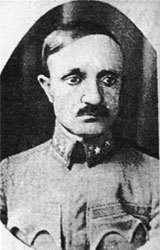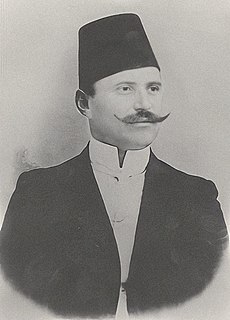 W
WAhmed Izzet Pasha, , known as Ahmet İzzet Furgaç after the Turkish Surname Law of 1934, was an Ottoman general of Albanian descent during World War I. He was also one of the last Grand Viziers of the Ottoman Empire and its last Minister of Foreign Affairs.
 W
WAhmed Niyazi Bey, , was the Ottoman bey of the Resne area in the late 19th and early 20th centuries. An ethnic Albanian, Niyazi was one of the heroes of the 1908 Young Turk Revolution and of suppressing the 1909 Ottoman countercoup as he played leading roles in both events. Niyazi is also known for the Saraj, a French-style estate he built in Resne.
 W
WMuharrem Bajraktari was an Albanian Muslim guerrilla fighter from Luma in northern Albania, and a political figure during World War II.
 W
WBekir Fikri (1882–1914), was an Ottoman revolutionary that participated in the Young Turk Revolution (1908) and fought with distinction during the Balkan Wars (1912-1913).
 W
WIsa Boletini was an Albanian commander, guerrilla, politician and rilindas from Kosovo.
 W
WRiza Cerova (1896—1935) was an Albanian political figure of the early 20th century. He is mostly known for his role during June Revolution of 1924 and Fier uprising of 1935.
 W
WGajur Dëralla was captain of the Luboten Battalion. The Luboten Battalion was a military division of the Balli Kombëtar which operated in Albania under Fascist Italy and Nazi Germany.
 W
WMehmet Pashë Deralla was an Ottoman Albanian military officer and civil servant, and one of the delegates of the Albanian Declaration of Independence. Mehmet Pashë Dërralla was the Minister of War in the Provisional Government of Albania. He was a major figure of anti-Ottoman uprisings, and also opposed Serbian and Montenegrin encroachments.
 W
WXhafer Ibrahim Deva was a Kosovo Albanian politician during World War II. A notable local politician in Kosovo and in Axis-occupied Albania, he took charge German-occupied Mitrovica and worked with the Germans to establish a pro-German Albanian government in Kosovo. Following the capitulation of Italy from the war, he helped form a provisional government under German occupation and set up the Second League of Prizren alongside other Albanian nationalists. On 5 November 1943, he was appointed Minister of the Interior of Albania and was effectively given direct command of the forces of the newly formed Albanian government. On 4 February 1944, police units subordinate to him massacred 86 residents of Tirana suspected of being anti-fascists. Deva was later involved in recruiting Kosovo Albanians to join the 21st Waffen Mountain Division of the SS Skanderbeg. He lost his position as Minister of the Interior with the dissolution of the Albanian government on 16 June, and subsequently became leader of the Second League of Prizren and led anti-Partisan operations around Prizren in September. Soon after, he fled to Croatia and then to Austria with the help of the Germans, where he joined other anti-Communist Albanians. After the war, he moved via Italy to Damascus, where he helped publish an exile newspaper entitled Bashkimi i Kombit. In 1956, he immigrated to the United States and briefly lived in New York and Boston before moving to Calaveras County, California in 1960. Here, he worked as an assistant supervisor at the mailing department of Stanford University in Palo Alto until his retirement in 1972. During this time, he led the Third League of Prizren and played an active role in organizing anti-Communist resistance until his death on 25 May 1978. Files released after his death showed that he had been recruited by the Central Intelligence Agency (CIA) while living in the United States.
 W
WLekë III Dukagjini (1410–1481), mostly known as Lekë Dukagjini, was a mysterious member of the Dukagjini family about whom little is known and who is thought to have been a 15th-century Albanian nobleman. A contemporary of Skanderbeg, Dukagjini is known for the Kanuni i Lekë Dukagjinit, a code of law instituted among the tribes of northern Albania.
 W
WPetrit Dume was an Albanian general and politician of the Albanian Party of Labour (PPSh).
 W
WEyüp Sabri, Ohrili Eyüp Sabri (1876-1950) known as Eyüp Sabri Akgöl after the 1934 Surname Law, was an Ottoman-Albanian revolutionary and one of the leaders of the Young Turk Revolution (1908).
 W
WNdok Gjeloshi (1893-1943) was an Albanian army officer and Militia commander during World War II.
 W
WMoisi Golemi, also known as Moisi of Dibra, was an Albanian nobleman and a commander of the League of Lezhë. In 1443–44 he captured all Ottoman holdings in the area of Dibër region. For a brief period in the 1450s he joined the Ottomans, but soon abandoned them and returned to the League. He died in 1464, when he was executed publicly in Constantinople after being captured by the Ottoman army. In Albanian folk tradition, Golemi became a popular hero mostly through the Song of Moisi Golemi.
 W
WXhemail Hasani, known as Xhem Hasa and Xhem Gostivari, was an Albanian nationalist and Axis collaborator, in charge of the Balli Kombëtar's activities in the western regions of Yugoslav Macedonia, a part of Yugoslavia occupied by Fascist Italy and Nazi Germany during World War II.
 W
WJaver Hurshiti was an Albanian military and political figure.
 W
WQazim Koculi was an Albanian politician of the early 20th century and one-day acting Prime Minister of Albania. He was also the principal military commander of the Albanian forces during the Vlora War in 1920. He was honored by the president with the title "Kalores i Urdhrit te Skenderbeut" in August 2020.
 W
WGjergj Arianiti or George Aryaniti (1383–1462) was a formidable Albanian lord who led several successful campaigns against the Ottoman Empire. He was father of Donika, the ally of Scanderbeg, as well as great uncle of Moisi Arianit Golemi. Gjergj Arianiti is enumerated in Albanian folk tellings. Gjergj Arianiti was Skanderbeg's ally within League of Lezhë only for a short period of time because he abandoned their alliance after the defeat in Berat in 1450. Robert Elsie emphasizes that Arianiti was often Skanderbeg's rival who allied with the Kingdom of Naples in 1446, left his alliance with Skanderbeg by 1449 and allied with Venice in 1456.
 W
WAbaz Kupi or Abas Kupi. He was also known as Bazi i Canës. He was an Albanian military officer.
 W
WGustav von Myrdacz was an Austrian noble who was instrumental in organizing the Royal Albanian Army from the early 1920s to 1945. He was referred to in Albania as Gustav Mirdashi.
 W
WBedri Pejani was 20th century Albanian politician. During World War II, he was one of the founders of the Second League of Prizren.
 W
WRexhep Pasha Mati was an Ottoman-Albanian Marshal, governor and war minister.
 W
WTeme Sejko was an Albanian rear-admiral and commander of the Albanian navy and the naval base of Durrës. In 1961 he was executed for allegedly being the leader of a pro-Soviet group that had been planning a coup d'état against Enver Hoxha by selling the Albanian Navy to the United States Sixth Fleet.
 W
WMefail Shehu, also known as Mefail i madh or Mefail Zajazi was a Balli Kombëtar military commander and leader of the Kicevo region during World War II. He was a close associate of Xhem Hasa.
 W
WShemsi Pasha (1846-1908) was an Ottoman-Albanian General.
 W
WLieutenant Colonel Ali Shefqet Shkupi, also known as Ali Shefqet Bey, was the first Chief of Supreme Staff of the Albanian Army bearing the functions of the Supreme Commander in the Albanian Government of Ismail Qemal Vlora.
 W
WGjergj Kastrioti, known as Skanderbeg, was an Albanian nobleman and military commander who led a rebellion against the Ottoman Empire in what is today Albania, North Macedonia, Greece, Kosovo, Montenegro and Serbia.
 W
WNako Spiru was an Albanian politician and high-ranking official of the Communist Party of Albania (PKSh).
 W
WEssad Pasha Toptani or Esad Pasha Toptani, mainly known as Essad Pasha, was an Ottoman army officer who served as the Albanian deputy in the Ottoman Parliament. He was a prominent politician in early 20th-century Albania. Toptani cooperated with the Balkan League after the Balkan Wars and established a state in central Albania, based in Durrës, called the Republic of Central Albania.
 W
WBajo Topulli was an Albanian nationalist figure of the Albanian National Awakening. Topulli was the older brother of Çerçiz Topulli.
 W
WÇerçiz Topulli was an Albanian revolutionary and guerrilla fighter involved in the national movement operating in the mountainous areas of southern Albania. He was the younger brother of Bajo Topulli. He was known for fighting the Ottomans in 1907 and 1908 and then after they left, the Greeks in 1913 and 1914 during the Balkan Wars.